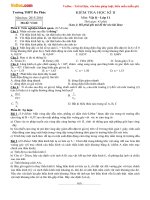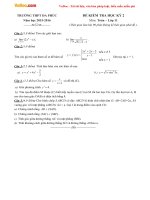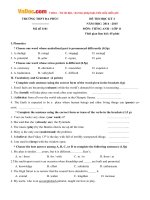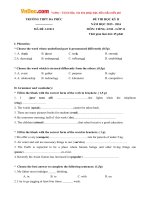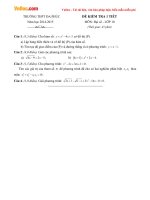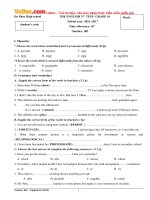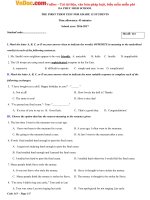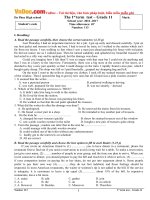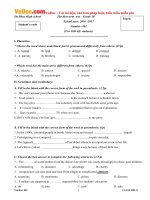Tải Đề thi giữa học kì 2 môn Tiếng Anh lớp 11 THPT Đa Phúc, Hà Nội năm học 2016 - 2017 có đáp án - Đề kiểm tra giữa kì 2 môn tiếng Anh lớp 11 có đáp án
Bạn đang xem bản rút gọn của tài liệu. Xem và tải ngay bản đầy đủ của tài liệu tại đây (119.27 KB, 5 trang )
<span class='text_page_counter'>(1)</span><div class='page_container' data-page=1>
<b>Da Phuc High school </b>
<b>The 3</b>
<b>rd </b><b> English test – Grade 11</b>
<b> School year: 2016 -2017</b>
<b> Time allowance: 45’</b>
<b> Number: 1102</b>
<b> </b>
<b>I. Phonetics: </b>
<b>* Choose the word whose underlined part is pronounced differently: (0.5p)</b>
1. A. sword B. swallow C. switch D. sweet
2. A. feature B. weather C. species D . decrease
<i><b>*Choose the word which is stressed differently from the others: (0.5p)</b></i>
3. A. electricity B. geothermal C. radiation D. alternative
4. A. distribute B. recipient C. document D. transmission
<b>II. Grammar and vocabulary:</b>
<i><b>A. Use the correct form or tense of the verbs in brackets: ( 1.5 p)</b></i>
1. I (<b>find </b>) …………..………this old photo while I (<b>look</b> ) …….……….for my passport.
2. The factory was fined for (<b>discharge</b>)……… chemicals into the river.
3. “Have you ever met the man ( <b>stand </b>) …...…. over there?” “No. Who is he?”
4. What you (<b>do</b>) ………..when I came to your office yesterday?
5. Johnny was the last applicant (<b>interview</b>)……….. for a position in that energy station.
<i><b>B. Use the correct form of the words in brackets: ( 1 p)</b></i>
1. She cares (<b>deep</b>) ………..………..about the environmental pollution.
2. The chemical (<b>pollute</b>) … ………. from cars and factories make the air, water and soil dangerously dirty.
3. What I like best about your house is its (<b>space</b>) ... kitchen.
4. The total energy (<b>consume</b>) ………..in 2005 was over 150 million tons
<i><b>C. Choose the best answer: (1.5p)</b></i>
1. There was no mention of the incident in the national <b>press</b>.
A. television B. Internet C. radio D. newspapers
2. Several rare species are dying ……… owing to human beings' deforestation and careless hunting.
A. out B. up C. away D. down
3. Human beings have great………on the rest of the world.
A. focus B<b>. </b>influence C. attention D. attraction
4. A nuclear reactor releases ………..which is dangerous to the environment.
A. heat B. energy C. carbon dioxide<b> </b> D. radiation
5. Farmers use …… pesticides to kill insects that devastate their crops.
A. a B. an C<b>. </b>X D. the
6. She always ………..calm throughout all the crises of her life.
A. remains B. thinks C. does D. acts
<b>III. Writing:</b>
<i><b>A. Find out one mistake in each sentence: (1 p)</b></i>
1. Her many friends, among who I like to be considered, gave her encouragement.
A B C D
2. I went to a reunion for students educating in the physics department during the 1980s.
A B C D
3. If the concentration of chlorine in water is careful controlled, it will not harm human beings.
A B C D
4. The recycling of waste paper and old newspapers help us save a great amount of wood.
A B C D
<i><b>B. Rewrite the following sentences, using the suggestions: (1.5 p)</b></i>
1. The shot was fired that day. It signalized the start of the American Revolution.
<i>( combine using</i><i><b>a participle</b>)</i>
</div>
<span class='text_page_counter'>(2)</span><div class='page_container' data-page=2>
2. Alex took the gun out of his pocket. He saw the robbers running down the street.(combine using
<i><b> a relative </b></i>
<i><b>pronoun</b></i>
<b> )</b>
-->...
3. The woman pays me a fair salary. I work for her. (<i>combine using <b>a preposition + a relative pronoun)</b></i>
-->...
<b>IV. Reading:</b>
<i><b>A. Read the passage carefully and choose the best option to fill in each blank: (1.25 p)</b></i>
The growth of cities and the (1) ………of industries in the nineteenth and twentieth centuries brought
increasing pollution of the rivers and waterways. As a consequence, water purification treatments have become more
and more important as a means of providing safe water.
The most widely used method of water purification is water filtration plants (2)…....remove impurities from the
water by passing it (3)…...sand, and, in some systems, treating the water with elements such as chlorine.
Filtration systems began in the Western Europe. The first treatment plants were built in 1829 to purify the River
Thames in England.
In 1854, the (4) ……….for water treatment plants became recognized and the need for pure water a matter of public
concern when London cholera epidemic was traced to public well. Most cities, first in England, then in the US and later
throughout the world, developed filtration plants to avoid cholera outbreaks that frequently ravaged (5)
………..communities.
1. A. growing B. decline C. development D. labour
2. A. when B. which C. what D. who
3. A. through B. under C. around D. above
4. A. cost B. liking C. popularity D. need
5. A. its B. their C. it D. theirs
<i><b>B. Read the passage carefully, then choose the correct answers: (1.25 p)</b></i>
Between the Revolutionary period and the World War I, the United States post office was set out to improve
transportation of the post office mails. From those early days to the present, the post office has helped develop and
subsidize every new mode transportation in the United States. Transportation has been the most important element in
mail delivery. Even when the general public had still suspected of the security of a new means of transportation, the
post office experimented with inventions that offered potential for moving the mail faster, occasionally suffering
embarrassment, ridicule, or even abuse in the process.
As mail delivery evolved from foot to horseback, stagecoach, steamboat, railroad, automobile, and airplane, with
intermediate and overlapping use of balloons, and helicopters, post office mail contracts ensured the income necessary
to build the great highways, rail lines, and airways that eventually spanned the continent.
By the turn of the 19th<sub> century, the U.S. Post Office had purchased a number of stagecoaches for operation on the</sub>
nation’s better post roads – a post road being any road on which the mail travels – and continued to encourage new
designs to improve passenger comfort and carry mail safely.
1. <i>The passage is about</i> ________.
A. the Post Office in the Revolutionary period C. the Post Office in the World War I
B. transportation of the Post Office in the US D. transportation and public ideas
2. <i>According to the passage, the main purpose of the Post Office is</i> ____.
A. to deliver mail as safely and fast as possible C. to subsidize every new mode of transportation
B. to develop transportation D. to apply new mean of transportation
3.<i> Which means of transportation used in the Post Office is NOT referred in the passage?</i>
A. train B. car C. plane D. motorcycle
4. <i>The Post Office</i> ________.
A. has never used helicopters in delivery B. makes no contribution to build roads
C. contributes income to build highways, railroads, and airways
D. has never been the first to use a new means of transportation
5. <i>Any road on which the mail travels is called</i>________.
A. motorway B. highway C. national road D. post road
<i>The end - Good luck!</i>
</div>
<span class='text_page_counter'>(3)</span><div class='page_container' data-page=3>
<b>The 3</b>
<b>rd </b><b><sub> English test – Grade 11</sub></b>
<b> Number: 1102 </b>
<b>I. Phonetics: </b>1.<b> A. sword</b> 2. B<b>. weather</b> 3. D.<b> alternative</b> 4. C.<b> document</b>
<b>II. Grammar and vocabulary:</b>
<i><b>A. Use the correct form or tense of the verbs in brackets: ( 1.5 p)</b></i>
1. found / was looking 2. discharging 3. standing 4. were you doing 5. to be interviewed
<i><b>B. Use the correct form of the words in brackets: ( 1 p)</b></i>
1. deeply 2. pollutants 3. spacious 4. consumption
<i><b>C. Choose the best answer: (1.5p)</b></i>
1. D. newspapers 2. A. out 3. B. influence 4. D. radiation 5. C. X 6. A. remains
<b>III. Writing:</b>
<i><b>A. Find out one mistake in each sentence: (1 p)</b></i> <i><b>1. B</b></i> <i><b>2. B</b></i> <i><b>3. B</b></i> <i><b>4. C</b></i>
<i><b>B. Rewrite the following sentences, using the suggestions: (1.5 p)</b></i>
1.
-->The shot fired that day signalized the start of the American Revolution.
2. --> Alex, who saw the robbers running down the street, took the gun out of his pocket.
3. --> The woman for whom I work pays me a fair salary.
<b>IV. Reading:</b>
<i><b>A. Read the passage carefully and choose the best option to fill in each blank: (1.25 p)</b></i>
1. A. growing B. decline <b>C. development</b> D. labour
2. A. when <b>B. which</b> C. what D. who
3. <b>A. through</b> B. under C. around D. above
4. A. cost B. liking C. popularity <b>D. need</b>
5. A. its <b>B. their</b> C. it D. theirs
<i><b>B. Read the passage carefully, then choose the correct answers: (1.25 p)</b></i>
1. B. transportation of the Post Office in the US 2. A. to deliver mail as safely and fast as possible
3.<i> </i>D. motorcycle 4. C. contributes income to build highways, railroads, and airways
5. D. post road
<b>Number: 1104</b>
<b>I. Phonetics: </b> 1.<b> A. extinct</b> 2. C<b>. beside</b> 3. D<b>. nuclear</b> 4. B. in<b>terferen</b>ce
<b>II. Grammar and vocabulary:</b>
<i><b>A. Use the correct form or tense of the verbs in brackets: ( 1.5 p)</b></i>
1. Had you worried 2. has just repaired / is washing 3. to power 4. sent coming
<i><b>B. Use the correct form of the words in brackets: ( 1 p)</b></i>
1. naturalists 2. survival 3. plentiful 4. unfortunately
<i><b>C. Choose the best answer to complete the following sentences: (1.5p)</b></i>
<b>1.A. resources</b> <b>2. C. ban 3. B. into </b> <b> 4. D. use 5. A. responsible </b> <b>6. C. the</b> <b>III. </b>
<b>Writing:</b>
<i><b>A. Find out one mistake in each sentence: (1 p)</b></i> <i><b>1. C</b></i> <i><b>2. B</b></i> <i><b>3. B</b></i> <i><b>4. C</b></i>
<i><b>B. Rewrite the following sentences, using the suggestions: (1.5 p)</b></i>
1. -->The people waiting for the bus in the rain are getting wet .
2. -> Mr. Marks, whose farm the stream flows across, is unhappy about the plans for the new dam.
3. --> The examination in which I was successful lasted two days.
<b>IV. Reading:</b>
<i><b>A. Read the passage carefully and choose the best option to fill in each blank: (1.25 p)</b></i>
1.<b> </b>A. produced B. supplied C<b>. used</b> D. stored
2. <b>A. remaining</b> B. resting C. leaving D. restricting
3. A. actually B. gradually C. consequently D.<b> increasingly</b>
4. A. transports <b>B. transportation</b> C. transporters D. transportable
5. A<b>. resource</b> B. reserve C. material D. power
<i><b>B. Read the passage carefully, then choose the correct answers: (1.25 p)</b></i>
</div>
<span class='text_page_counter'>(4)</span><div class='page_container' data-page=4>
<b>KEYS</b>
<b>The 3</b>
<b>rd </b><b><sub> English test – Grade 11</sub></b>
<b> Number: 1106 </b>
<b>I. Reading:</b>
<i><b>A. Read the passage carefully, then choose the correct answers: (1.25 p)</b></i>
1. D. transportation of the Post Office in the US 2. A. to deliver mail as safely and fast as possible
3.<i> </i>B. motorcycle 4. D. contributes income to build highways, railroads, and airways
5. B. post road
<i><b>B. Read the passage carefully and choose the best option to fill in each blank: (1.25 p)</b></i>
1. A. growing B. decline <b>C. development</b> D. labour
2. A. when <b>B. which</b> C. what D. who
3. <b>A. through</b> B. under C. around D. above
4. A. cost B. liking C. popularity <b>D. need</b>
5. A. its <b>B. their</b> C. it D. theirs
<b>II. Writing:</b>
<i><b>A. Find out one mistake in each sentence: (1 p) 1. C</b></i> <i><b>2. B</b></i> <i><b>3. B</b></i> <i><b>4. B</b></i>
<i><b>B. Rewrite the following sentences, using the suggestions: (1.5 p)</b></i>
1. --> The woman for whom I work pays me a fair salary.
2.
-->The shot fired that day signalized the start of the American Revolution.
3. --> Alex, who saw the robbers running down the street, took the gun out of his pocket.
<b>III. Grammar and vocabulary:</b>
<i><b>A. Choose the best answer to complete the following sentences: (1.5p)</b></i>
1. A. remains 2. C. X 3. D. radiation 4. B. influence 5. A. out 6. D. newspapers
<i><b>B. Use the correct form or tense of the verbs in brackets: ( 1.5 p)</b></i>
1. to be interviewed 2. were you doing 3. discharging 4. found/ was looking 5. standing
<i><b>C. Use the correct form of the words in brackets: ( 1 p)</b></i>
1. consumption 2. spacious 3. deeply 4. pollutants
<b>IV. Phonetics: </b>1. C.<b> document</b> 2. D.<b> alternative</b> 3. B<b>. weather</b> 4.<b> A. sword</b>
<b> Number: 1108</b>
<b>I. Reading:</b>
<i><b>A. Read the passage carefully, then choose the correct answers: (1.25 p)</b></i>
1. <b>A. to show that destroying the ivory trade was the only way to save Africa’s elephants</b>
2. <b>B. poachers</b> 3. <b>C. the ivory trade</b>
4. B<b>. human- wildlifeconflict</b> 5. D<b>. Developing long-term land use policies.</b>
<i><b>B. Read the passage carefully and choose the best option to fill in each blank: (1.25 p)</b></i>
1.<b> </b>A. produced B. supplied C<b>. used</b> D. stored
2. <b>A. remaining</b> B. resting C. leaving D. restricting
3. A. actually B. gradually C. consequently D.<b> increasingly</b>
4. A. transports <b>B. transportation</b> C. transporters D. transportable
5. A<b>. resource</b> B. reserve C. material D. power
<b>II. Writing:</b>
<i><b>A. Find out one mistake in each sentence: (1 p) 1. C</b></i> <i><b>2. B</b></i> <i><b>3. B</b></i> <i><b>4. C</b></i>
<i><b>B. Rewrite the following sentences, using the suggestions: (1.5 p)</b></i>
1. -> Mr. Marks, whose farm the stream flows across, is unhappy about the plans for the new dam.
2. --> The examination in which I was successful lasted two days.
3. -->The people waiting for the bus in the rain are getting wet .
<b>III. Grammar and vocabulary:</b>
<i><b>A. Choose the best answer to complete the following sentences: (1.5p)</b></i>
1. <b>C. the</b> 2. <b>A. responsible</b> 3. D<b>. use</b> 4. B<b>. into</b> 5. <b>C. ban</b> 6. <b>A. resources</b>
<i><b>B. Use the correct form or tense of the verbs in brackets: ( 1.5 p)</b></i>
1. coming 2. sent 3. has just repaired / is washing 4. Had you worried 5. to power
<i><b>C. Use the correct form of the words in brackets: ( 1 p)</b></i>
</div>
<span class='text_page_counter'>(5)</span><div class='page_container' data-page=5></div>
<!--links-->
